
What are your three greatest strengths and weaknesses?
This is one of the most common job interview questions, and also one of the most challenging. The first part is a slam dunk; the second is a potential landmine unless you are careful. For strengths, keep in mind that every company needs people who can do three things well: 1) earn revenue; 2) save money; and 3) save time. For weaknesses, avoid admitting to character flaws. I prefer a “weakness” to be skill-related and past tense: “I wasn’t astute with PowerPoint when I first started, but I read a great book, practiced, and became very proficient. Now I train others in PowerPoint presentations.” Any time you can demonstrate how you overcame a weakness, all the better. Another good “weakness” example is to give general answers in which you can plug perceived strengths: “I am passionate about my work and always give each task my all. So sometimes when I see others loafing, I can get frustrated.”

What keeps you up at night?
Another landmine you cannot step on. This is another way of asking for weaknesses. As you begin to feel more and more comfortable with the interviewer, there is a tendency to let your guard down. Don’t. The answer is: “Aside from the occasional nightmare about interviewing, I work so hard that I rarely have a difficult time sleeping. I believe in proper time management and recharging my batteries with sound sleep. I’m no good to anyone if I’m tired.”
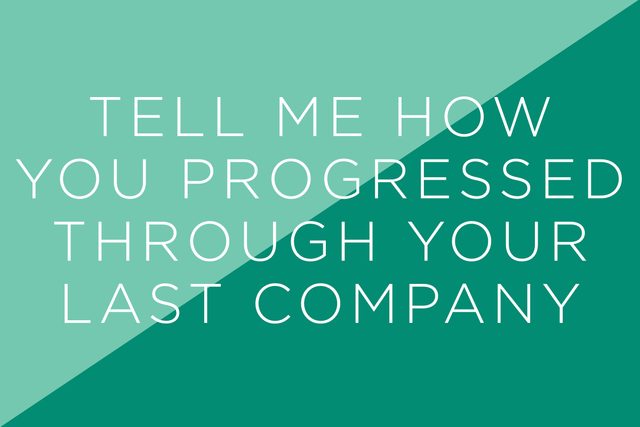
Tell me how you progressed through your last company
A good question particularly if he or she is looking for a promotable candidate. Here you can intersperse more about your personal and business traits. Be very complimentary of the company you work for: “The training was superb” or “I was fortunate to have some great mentors who really helped me.” It will be hard not to ramble a little, but focus on the promotions by title as a result of dedicated hard work and outstanding accomplishments with outright genius. If you haven’t been formally promoted, mention a few new challenges you’ve faced and how you’ve overcome them.

If you were a color, which one would you be?
I was actually asked this in a high-powered job interview. I smiled and answered: “The rainbow. There are four basic personality types in individuals and I pride myself on trying to recognize and adapt to each one, depending on the situation. Sometimes I need to be red; sometimes green; sometimes black and white; sometimes even pink.” The interviewer laughed and actually said, “Great answer!” You won’t believe people actually committed these hilarious job interview faux pas.

How long would you stay with our company?
This is a good question to get asked; it is a “buy” signal, implying that he or she is thinking of offering you the job. But it can be tricky: Is he or she concerned that I would leave after a short while? Don’t take the bait. You can put the hot potato back in the interviewer’s lap with an answer such as: “I would hope to have a great career with this company. I respond well to direction and am always looking to learn. I define success as being ready when an opportunity arises. How long do you think I’d be challenged here?”
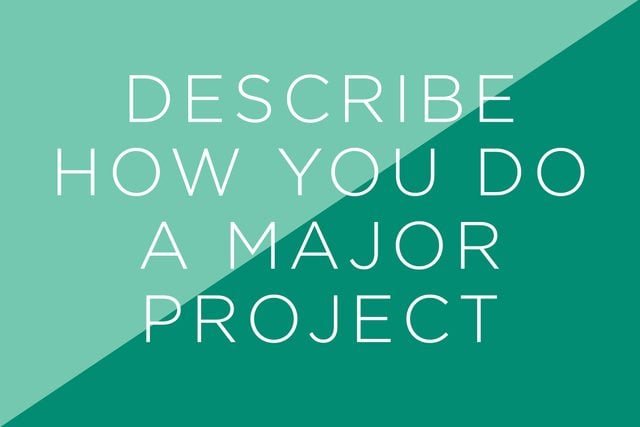
Describe how you do a major project
This is a perfect opportunity to demonstrate that you are a business manager who can identify and solve problems: “I believe in effective strategic planning that involves both forward thinking (in other words, what resources will I need?) and backward thinking (for example, if the deadline is the end of the quarter, what steps need to be made and at what time to achieve a successful outcome?).”

How do you handle stress?
The best way to answer this is to deflect it: “I avoid stress by careful time management. There are only so many hours in a given day, so I try to maximize my time by setting effective goals. On the personal side, I exercise regularly, eat right, and get adequate sleep. I think this helps alleviate stress.”

What would you do during your first 90 days on the job?
Fair question in the interviewer’s mind but unfair to the interviewee. The interviewer cannot expect you to know the intricacies of the position and the company, so you can be general here. After responding with some generalities, I like to send this one back to the interviewer: “I believe in setting my goals in line with the company’s near-term objectives, which I would expect to receive right away. Then I would prioritize my time relative to achieving those goals. What are the company’s most pressing needs right now and do you offer a standard training program?” This question might be a little unfair, but there are others that are just plain inappropriate. Here’s how to handle them.
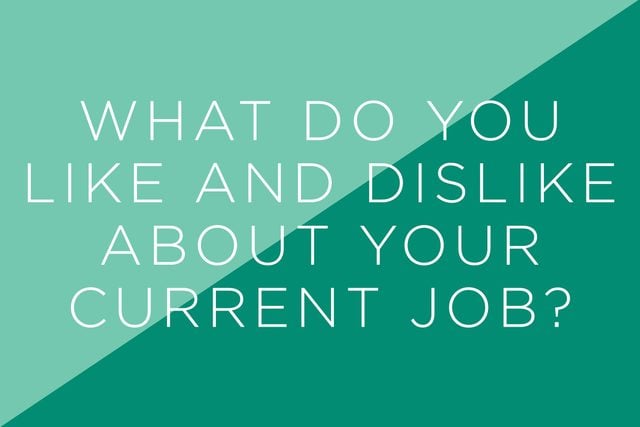
What do you like and dislike about your current job?
This is what I call the “wince” question. The interviewer winces just after asking it, hoping you don’t step on a landmine by blurting out a negative answer. Even if your current company is a torture chamber, don’t tell the interviewer. He or she is actually looking for you to give a positive response. Say, “As you know, I wasn’t looking and am doing well in my current job. I love the training and the culture. Our products and services are superb. My boss is supportive and a great teacher. But my company is being sold, so I’m concerned about my future security. But regardless of my company’s security, both this opportunity and your company seem ideal to me.” If your company is not for sale, you can always say, “The company is small and there isn’t much room for me to grow.” If the reverse is true, say, “I’m looking for a smaller company where I can make a big difference.” Be upbeat about all your experiences and shift gears to show how applicable your training is to the job for which you are interviewing. Here’s how to look for a job while you still have one.
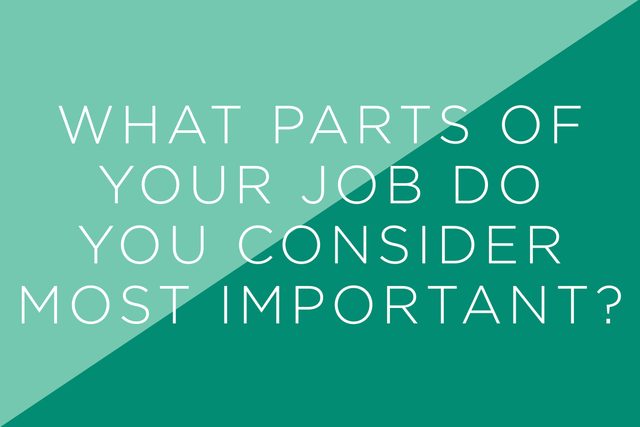
What parts of your job do you consider most important?
Under the pressure of an interview, many candidates immediately think of the opposite, conjuring up all the things they hate about their current job. There’s also a tendency to dive into minutiae and rattle off meaningless tasks as they pop into your head. Exercise care. Think “big picture” in your answers and intersperse positive character traits. Remember, you want to paint yourself as someone who is a business manager who can run the business. Try, “My ability to manage my time wisely. First, I set daily goals, prioritizing them in order of importance, and then attack them until completion, while avoiding distractions.” Be prepared to list an example of an impressive accomplishment. Here’s how to manage your time to make your first hour of work as productive as possible.
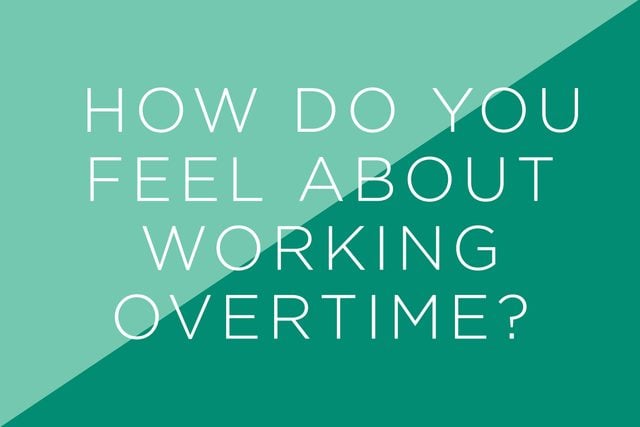
How do you feel about working overtime?
Now is not the time to tell the interviewer how you cannot work any extra hours because you are training for the Iron Man Triathlon and have a sick parent and see a shrink five times a week. The best answer is, “Though I pride myself on time-management and prioritization skills, I realize that extra time is sometimes needed.”

Describe your leadership skills
Demonstrate your ability to convince others to express desirable behavior and take specific action. You pride yourself on leading by example. Integrate one or more of the following answers into your description: “being able to effectively persuade, motivate, lead, empower others, negotiate, act positively, create opportunities, and influence others.”

Tell me how you coach and develop talent
This is another way of asking how you manage people, with a twist. You always strive for positive reinforcement in your coaching with direct and timely feedback. You have a commitment to learning and treat each person how you would want to be treated (good old Golden rule). Close with examples of people you have hired, trained, and promoted to greater responsibilities, and how great it made you feel. Use these 8 tricks to get your coworkers to trust you.
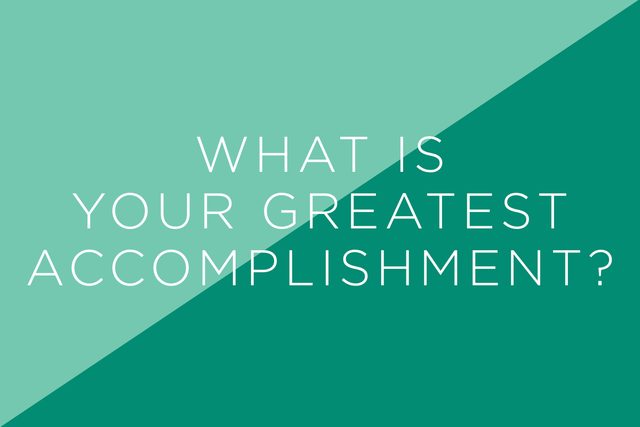
What is your greatest accomplishment?
Does the interviewer mean personal or business? Ask the qualifier and if the answer is “both,” great; if it is “pick one over the other in rank,” go with business — maybe a major promotion that was a culmination of all your hard work, accomplishments, and dedication. Steer clear of mentioning the birth-of-your-kid answer in a business interview; though it may be true (and it probably should be), keep in mind that you are interviewing for a professional job.

Sell me this pen
This is one of the most common job interview questions for sales jobs, especially entry level. It’s a test of your ability to open, persuade, then close. The interviewer is looking for you to uncover the customer’s needs and wants, to select key features of the product, and to sell the benefits of these features. A basic rule of selling: sell the benefits the customer will gain from the product rather than the list of features the product has. Don’t make the mistake of babbling about all the features before you know what the customer’s hot buttons are. Ask, “What’s important to you when buying a pen?” Then listen carefully. Body language is just as important as what you say; make sure you don’t make one of these interview mistakes.

Do you have any questions?
You always have questions. Responding, “No, I think we covered it all” gets you the boot. This is your one last chance to make a favorable impression. Come prepared with a notepad with at least five good questions that demonstrate your research on the company. I like the kiss-up questions here: “With the impressive results the company has had in the last five years, where do you see the company in the next five years?” Or, “I’ve heard some wonderful things about your company. How do you think your competitors feel about it?” After the brown-nose questions, ask, “What key skills and attributes are most needed to succeed in this job?” After the interviewer gives you the answers, plug in some examples of demonstrated success you have in each of these areas.